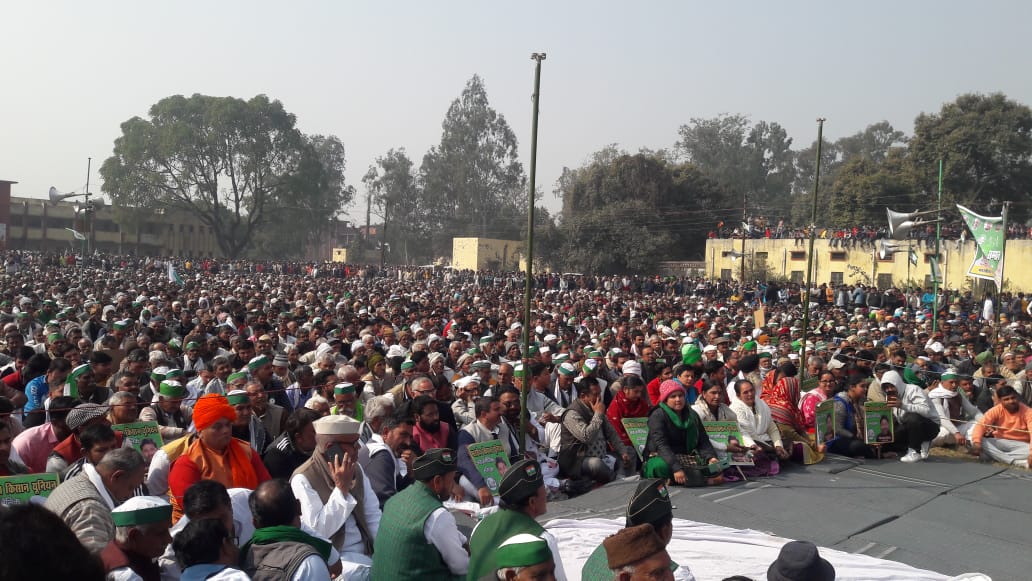Farmer’s movement: Is ethics at issue?

In the modern world, in the world of industries and metropolis and the world governed by centralized rule, the farmer and the village have always been at the receiving end, forced to live a life without dignity and resources. The value created by their labour and knowledge is transferred away from them and is used to build industry, metropolis and, as if, the entire modern lifestyle.
By Sunil Sahasrabudhey
All our friends and co-workers who have social concern are in support of the ongoing farmer’s movement in the country. They are pained by the suffering of the farmers and want the matter to be resolved soon. There have been several rounds of meetings between the Movement and the Government. But it is difficult to say whether any actual dialogue is taking place. Why is the dialogue not taking place? Perhaps because the idea that the farmers have of the future of this country, the society and their well-being, is at great variance with the dominant view in the upper classes of the country and the world today. A farmer is not ready to accept his pauperization and also does not want that someone else takes the decisions about his work and life. In the modern world, in the world of industries and metropolis and the world governed by centralized rule, the farmer and the village have always been at the receiving end, forced to live a life without dignity and resources. The value created by their labour and knowledge is transferred away from them and is used to build industry, metropolis and, as if, the entire modern lifestyle. This happens both in the world of private or public enterprise. Therefore even if some solution is found to the immediate crisis, it is only legitimate to think about the long term. A small effort in this direction is attempted below.
It is necessary to keep the market away from food grains. And it is also necessary that the production of food grains be as attractive as any other agricultural production. It is here that the agricultural sector needs major governmental intervention. It is said that the year in which agricultural produce gets a reasonable price, the market in the villages and small towns see visible increase inactivity. This is where development and well-being meet. The extent and type of modernization such economic activity may lead to is what the nation needs. Hence, if capital unrelated to agriculture is invested in agriculture and that too without government control, it will lead to increased exploitation of the peasantry and profits generated in that process will propel the activity in the markets of the metropolis and the international market. This may enrich further a small percentage of people in the country, otherwise, this is that jobless growth where the West has already arrived and our governments are so eager to follow suit.
People with social concern have been saying this for a while that our political system has become such that those sitting in the legislatures do not think about the well-being of the people in general or the farmers in particular. The chief reason for this seems to be that questions related to morality have become irrelevant in the public social space. That is if someone talks about morality in the market, people may call him a fool. The biggest question of today seems to be how morality finds a place in markets and politics. This means that in matters of buying and selling the issues of being morally correct and just would have precedence over considerations of profit. When the government makes a policy or passes a law, questions of justice would take precedence over other considerations. When the moral consideration takes a back seat in electoral contests and the political parties decide on contestants keeping only win-ability as the criteria, it is precisely here that the idea of honest ‘representation’ finds its burial. Those who win are under no constraint to be sensitive towards people’s needs, similar to what we find in the market place, namely that those who make money in the market through their cunning and heartless management, hardly have any fraternal feeling towards others in society. It may not be difficult to see that absence of dialogue between the Farmers' Movement and the Government, despite several rounds of meetings, is due to some such situation. It is only when morality gets its due place in public discourse that we can expect the dialogue to resume effectively and not to run into such a dead end.
We need to think deeply and dialogue on how to keep the market away from the food grains. Such reflections can take us towards including morality as an essential part of public discourses and this may give direction to thinking about systems of society and government which have at their centre considerations of the well-being of humanity, nature, society and country. Let us remember that some ten years ago there was a huge anti-corruption movement in this country which brought ‘swaraj’ in public discourse again. Perhaps in the understanding of ordinary men and women swaraj means that system of society and government which is based on morality, truth and bhaichara (brotherhood) and not in competition, profit and power. Can starting a dialogue on swaraj open pathways for re-instituting morality among public criteria. This dialogue on swaraj will require to be wholesome- politics, society, economics, nature, culture, philosophy, global and local, everything to have its share.
Sunil Sahasrabudhey is a political-social activist and philosopher with over thirty years of experience of people’s movements in India.
